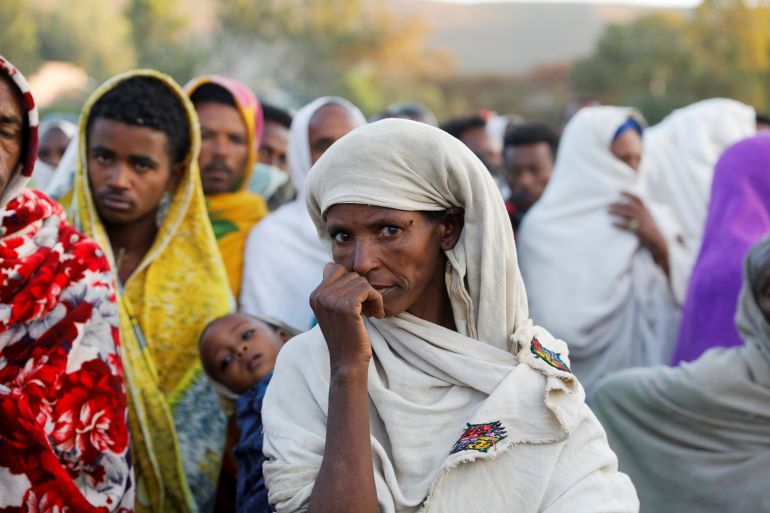US sanctions Eritrean army, ruling party over Ethiopia conflict
US says presence of Eritrean forces in Ethiopia ‘an impediment’ to ending conflict and increasing humanitarian access.

The United States has sanctioned the Eritrean military and the country’s ruling party for “contributing to the crisis and conflict” in Ethiopia, which has displaced more than 2.5 million people and killed thousands.
In a statement on Friday, the US Treasury Department said it was sanctioning the Eritrean Defence Forces and the People’s Front for Democracy and Justice, as well as other individuals and entities.
Keep reading
list of 3 itemsEthiopia gov’t outlines terms for possible Tigray ceasefire talks
How to address the sexual violence epidemic in Ethiopia?
The Eritrean military’s presence in Ethiopia, the department said, “is an impediment to ending the ongoing fighting and increasing humanitarian access”.
“We condemn the continued role played by Eritrean actors who are contributing to the violence in northern Ethiopia, which has undermined the stability and integrity of the state and resulted in a humanitarian disaster,” Director of the Office of Foreign Assets Control Andrea M Gacki said in the statement.
The sanctions come just days after United Nations political chief Rosemary DiCarlo warned that Ethiopia risks “descending into widening civil war”.
The Ethiopian government’s conflict with the Tigray People’s Liberation Front (TPLF) began a year ago and has accelerated in recent days, with a nationwide state of emergency declared this month and residents of the capital, Addis Ababa, told to be ready to take up arms to defend residential areas.
Thousands have been killed and more than two million have fled their homes since last November, when Prime Minister Abiy Ahmed launched a military offensive against the TPLF, which had long run Tigray and was a main player in Ethiopia’s national politics.
Hundreds of thousands are also facing famine-like conditions, according to the UN, and the fighting has spread from Tigray into the neighbouring Afar and Amhara regions.
Eritrea in April acknowledged for the first time that its forces were taking part in the war in Tigray and promised to pull them out in the face of mounting international pressure.
For months, the Ethiopian and Eritrean governments had denied Eritreans were involved, contradicting testimony from residents, rights groups, aid workers, diplomats and even some Ethiopian civilian and military officials.
In August, the US sanctioned General Filipos Woldeyohannes, the chief of staff of the Eritrean Defence Forces, for “serious human rights abuse” by his forces in Tigray. The US at that time urged the Eritrean military “to immediately and permanently withdraw its forces” from Ethiopia.
Eritrean Information Minister Yemane Ghebremeskel, Ethiopian government spokesperson Legesse Tulu and Abiy’s spokesperson Billene Seyoum did not immediately respond to requests for comment by the Reuters news agency on Friday’s sanctions.
Sanctions also were issued against the economic adviser of the People’s Front for Democracy and Justice (PFDJ) and the head of the Eritrean national security office, the Treasury Department said.
Hidri Trust, which the US Treasury said is the holding company of all the business enterprises of the PFDJ, and the Red Sea Trading Corporation, which manages its property and financial interests, were also sanctioned.
Separately on Friday, US Secretary of State Antony Blinken warned that Ethiopia risked imploding, with disastrous consequences for the region, unless the government and rebels negotiate a deal.
A failure to reach a settlement “would lead to the implosion of Ethiopia and spillover into other countries in the region, and that would be disastrous for the Ethiopian people and also for countries in the region”, Blinken, who will travel next week to neighbouring Kenya, told reporters.
He also reiterated his support for African Union mediation led by former Nigerian President Olusegun Obasanjo, saying the US was “working very closely” to support those efforts “to mediate a way forward with all the Ethiopian parties”.
Meanwhile, White House press secretary Jen Psaki said the Biden administration is delaying plans to issue sanctions against “elements aligned with the TPLF and the Ethiopian military” to see if African Union efforts make progress.
“If they do not seize the opportunity and the parties continue escalating the war, we will move forward with these sanctions, but we are currently leaving space for these talks to continue,” Psaki said on Friday.
A day earlier, the Ethiopian government set out conditions for possible ceasefire talks with leaders of the TPLF.
Foreign Ministry spokesman Dina Mufti told reporters on Thursday that one of the conditions for possible talks – which he stressed had not been agreed to – would be for the TPLF to withdraw from the Amhara and Afar regions bordering Tigray.
“In order for there to be a peaceful solution, they say it takes two to tango,” Dina said.
TPLF spokesman Getachew Reda has previously said that pulling out from Amhara and Afar before talks begin is “an absolute non-starter”.